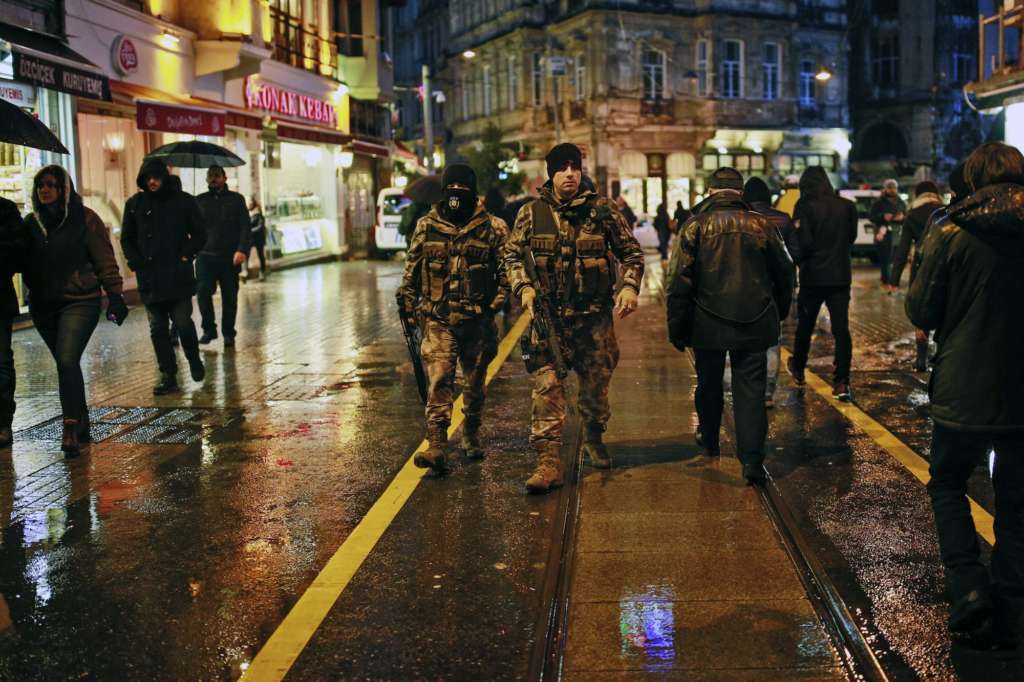Riyadh- The terrorist attack that targeted a night club in Istanbul on New Year’s Eve was part of ISIS’ strategy to hit religious events and celebrations. But carrying it on New Year’s Eve was a sort of warning that the organization’s future plan includes a constant wave of attacks against Turkey. Turkey’s geographic location – having borders with both Syria and Iraq – facilitates the infiltration of extremists through Turkey to areas considered ISIS strongholds.
The Turkish decision to confront ISIS and the launch of military operations in Syria and Iraq may be the first reason behind the Istanbul attack. ISIS first attacked Turkey in 2015. But intensified its assaults lately after the Turkish Parliament renewed its mandate to the Turkish Government to send armed forces to Syria and Iraq until the end of October 2017.
Ankara has aimed to establish a terrorist-free security zone and to target extremist groups in their core, as announced President Recep Tayyip Erdogan. In fact, the Turkish Army has launched a military operation known as the “Euphrates Shield” in Syria, while Turkish forces have also spread in Bashiqa Base in Nineve – Iraq, seeking the recapture of Mosul.
This development was a major reason behind ISIS’ increased attacks against Turkey, trying to put the country under pressures even by using random techniques like the attack carried out by the gunman at the Istanbul nightclub.
ISIS’ attacks in Turkey are not surprising. On November 3, 2016 and in December 2105, Abu Bakr al-Baghdadi incited the organization’s members to invade Turkey and carry out operations in the country.
Clear confusion in ISIS
In his latest audio message, Baghdadi tried to incite his supporters to attack Turkey with a message that has strong religious wordings;
The speech was titled “This is What Allah and His Messenger Had Promised Us.”
However, many other messages lacked religious wordings and appeared like a direct confrontation between Turkey and the organization; in his last speech, Baghdadi highlighted Ankara’s role in the Mosul battle as a reason to attack Turkey and urged the group’s members to move the battle to the Turkish territories.
Baghdadi’s media appearances in incenting his followers seemed to be the main reason behind their success in carrying out their assaults. The attack that targeted Istanbul’s Atatürk Airport on June 28 and killed 43 people may be one of the most effective operations because it hit an important hub that attracts the largest share of tourists. The airport is also considered a symbol of secularity for being named after Mustafa Kemal Atatürk, one of the most prominent symbols of the modern secular Turkey.
Raising doubts on Turkey’s Islamic identity
As part of ISIS’ efforts to raise doubts on Turkey’s Islamic identity, the organization released a video on December 22, 2016 that features two kidnapped Turkish soldiers being burned alive. In this video, extremist members promised to turn Turkey into a land for Jihad. This kind of messages emphasizes a sort of confusion between the organization’s political and religious descriptions, especially with its constant target of Muslims without introducing clear religious justifications.
Recently, ISIS concentrated its campaigns against Turkey, which was emphasized in the organization’s media publication in the Turkish language. These publications have been used by the terrorist group to communicate with its Turkish followers and to recruit new Turkish members.
While ISIS’ publications dignify the concept of Islamic Caliphate and seek to consider it a stronghold for Muslims that will solve all their problems, they also focus on attacking Erdogan and describe the members of the Turkish army as atheists.
On the other hand, after targeting the nightclub on New Year’s Eve, ISIS used a religious justification, saying that one of its soldiers targeted a place where Christians celebrate their holidays as a response to the Turkish government’s violations against Muslims.
Recruitment-related considerations
According to observers, the confusion stated above shows that ISIS is not ready or eager to change its religious speech on the Turkish level for many reasons:
1-The terrorist organization has had a wide foundation of supporters in Turkey, based on many recruitment offices in many areas like Gaziantep on the Turkish-Syrian borders.
2- ISIS militants who entered Turkey from Iraq and Syria come from different nationalities and ethnicities; the Turkish authorities said that the nightclub gunman is probably an Uighur from China.
Finally, ISIS is not the only terrorist organization that targets Turkey, as the Kurdistan Workers’ Party (PKK) also announced responsibility for many assaults and operations that took place in the country. Turkish authorities suggested that the attack in Izmir in early January was carried on by the PKK.
